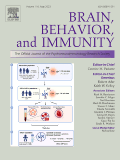
“Early-life inflammation has been shown to exert profound effects on brain development and behavior, including altered emotional behavior, stress responsivity and neurochemical/neuropeptide receptor expression and function.
The current study extends this research by examining the impact of inflammation, triggered with the bacterial compound lipopolysaccharide (LPS) on postnatal day (P) 14, on social behavior during adolescence.
We investigate the role that the endocannabinoid (eCB) system plays in sociability after early-life LPS.
These data suggest that alterations in eCB signaling following postnatal inflammation contribute to impairments in social behavior during adolescence and that inhibition of FAAH could be a novel target for disorders involving social deficits such as social anxiety disorders or autism.”
